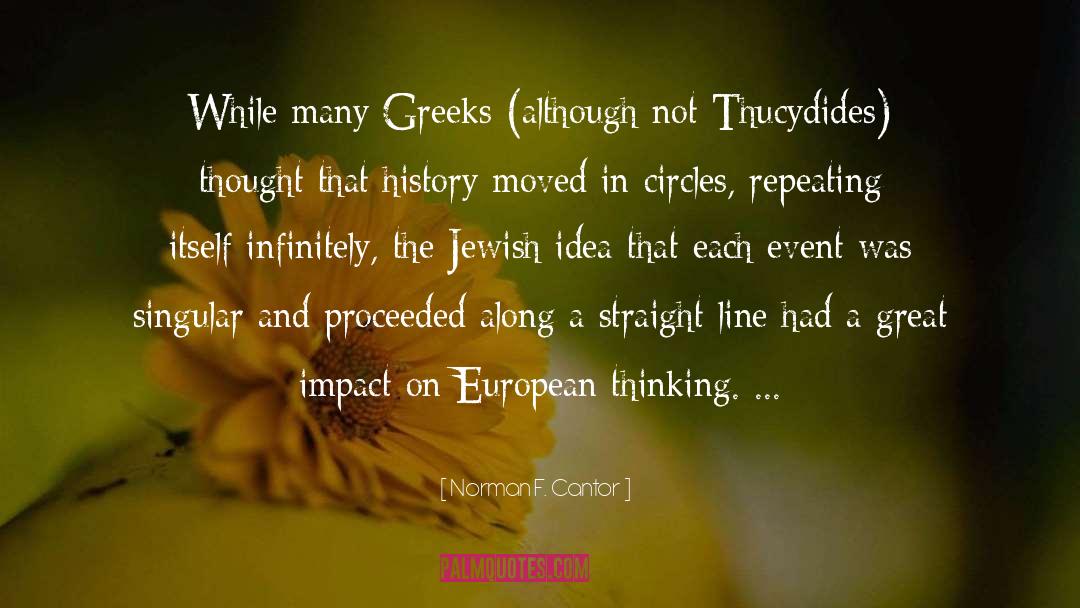Norman F. Cantor Famous Quotes
Reading Norman F. Cantor quotes, download and share images of famous quotes by Norman F. Cantor. Righ click to see or save pictures of Norman F. Cantor quotes that you can use as your wallpaper for free.
The mindset of antiquity lacked economic science and sociological theory. The ancients did rather well with political narrative, although, except for Thucydides, no first-rate political annalist and analyst emerged from the literary populace. But the ancients never showed a capacity, or even an inclination, to examine closely the urban world they themselves inhabited.
"Neither, however, was the medieval world in the 500s through the 1500s, which succeeded antiquity, much better at economics and sociology. It was only in the eighteenth and early nineteenth centuries that this kind of thinking emerged with Adam Smith and Alexis de Tocqueville in response to industrial and political revolutions.
"What interested the urban dwellers of antiquity were the gods. During the Hellenistic and Roman eras the theoretical capacity of the literate urban population was given over to thinking about the nature of divinity. The chief theological formats were polytheism (many gods); monotheism (one god); dualism (two dogs, one good, the other evil); and dying and reborn savior gods that could also be fitted into the other three categories of divinity.
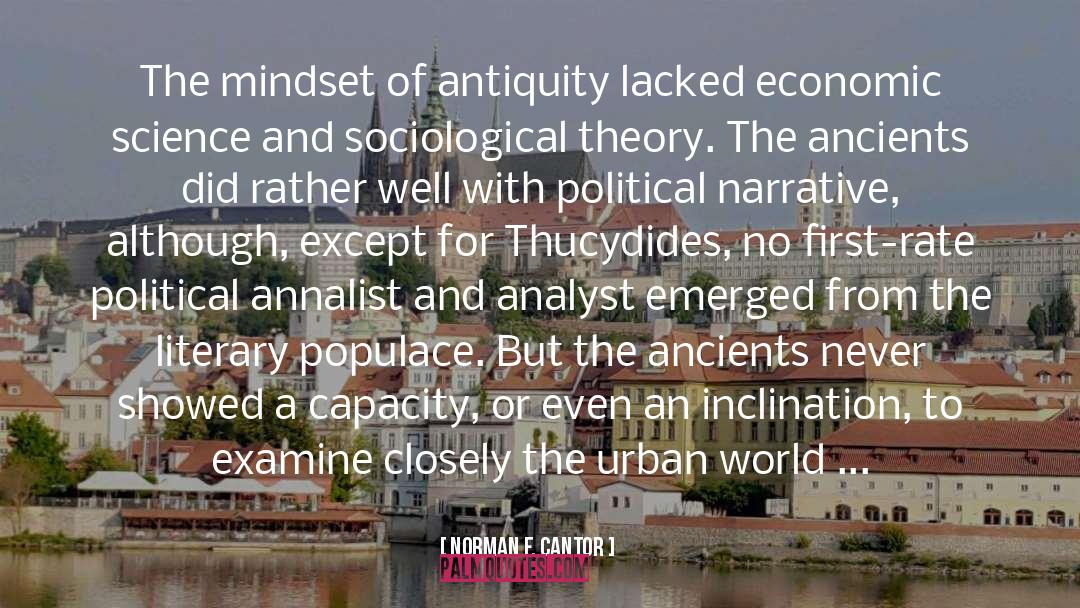
There are other special problems connected with the discovery of ancient cities. Alexandria was ravaged by fires and street fighting, and its ancient waterfront is underwater. Some discoveries at Pompeii were not revealed for many decades, because the wall paintings are so pornographic.
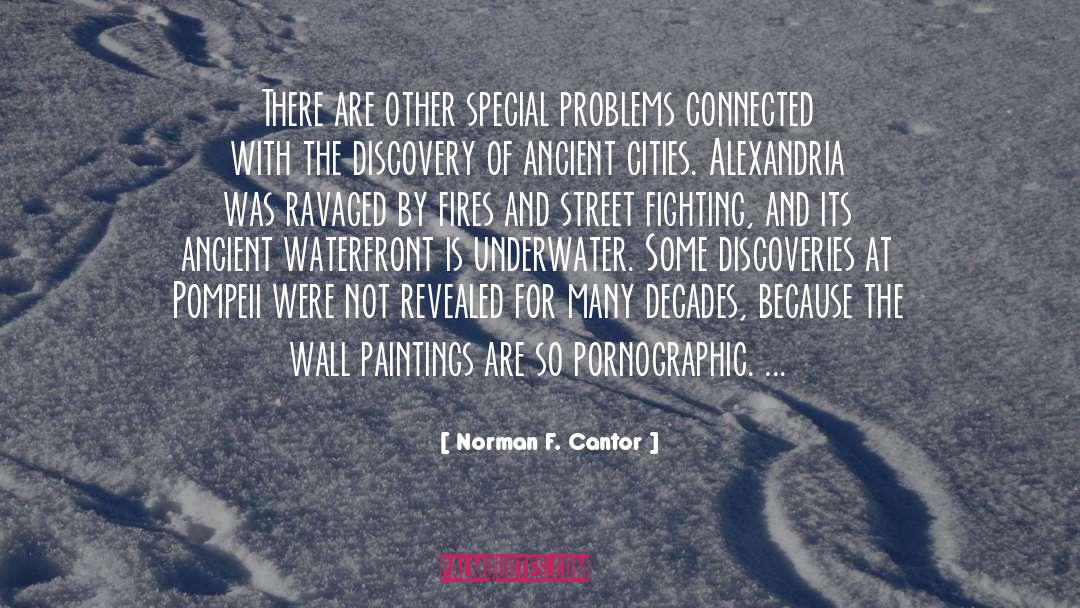
The classical heritage as shaped by and filtered through Roman culture had two great flaws. First, it prevented the very rich oral cultures of the ancient Mediterranean from surviving from antiquity into later times. All that was left as creative forces were Greek philosophy and Roman law. These were very substantial cultures but they represented a great narrowing of what could be passed on from antiquity to later centuries...
"Second, another deficiency of classical culture was its lack of social conscience, its obliviousness to the slavery, poverty, disease, and everyday cruelty endured by more than half of the fifty million people who inhabited the empire. The classical heritage represented a narrow and insensitive social and political theory reinforcing a miserably class-ridden and technologically stagnant society.
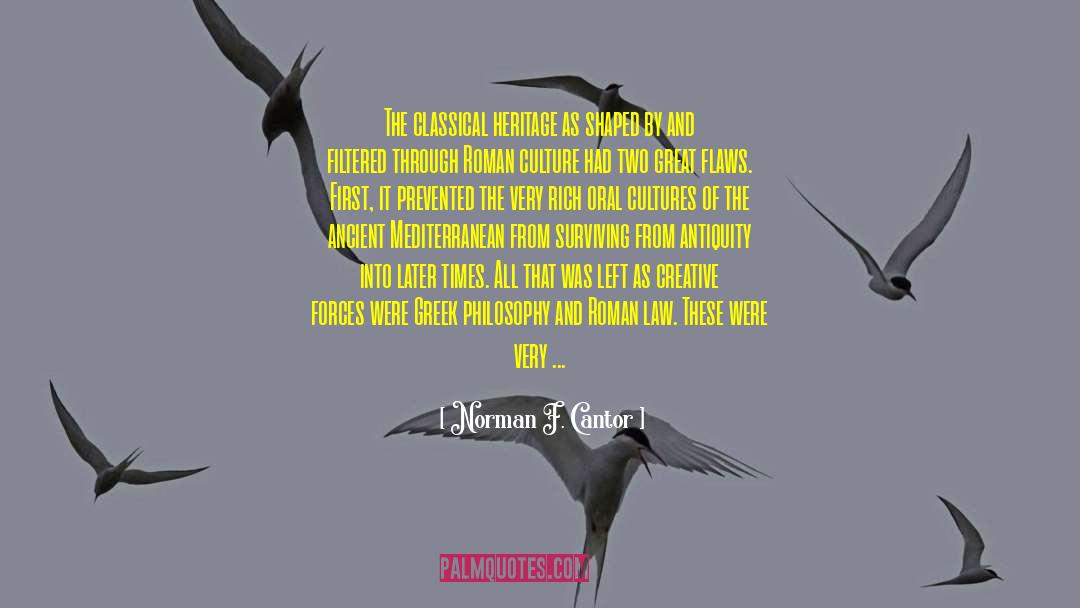
The German economic historian Fanz Oertel in the 1950s points to another drastic consequence of a slave economy. A slave economy initially allowed an increase of productivity through the invention and use of new machinery. Roman products remained at a simple level and could be reproduced by handicraft. By the fourth century, for example, the robust pottery industry of Greece was in sharp decline because other parts of the empire also learned to make pottery.
"The decline in international trade in the Mediterranean in the fourth century was partly due to increasing piracy, but it was also due to lack of industrial innovation and of need for exchange of manufactured goods.
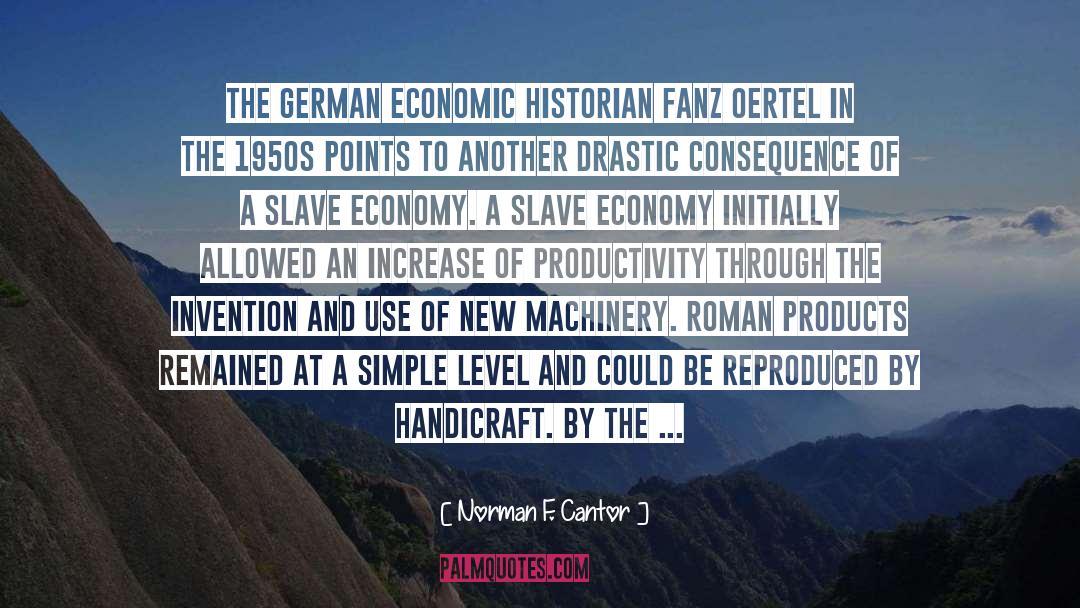
authoritarian institutions, such as governments and churches, do not use language but jargon, repetitive phrases that are not supposed to have meaning but merely enforce obedience. Language has its own internalizing ethic; it is individualistic and thus threatening to any monolithic system that demands a chorus or litany.
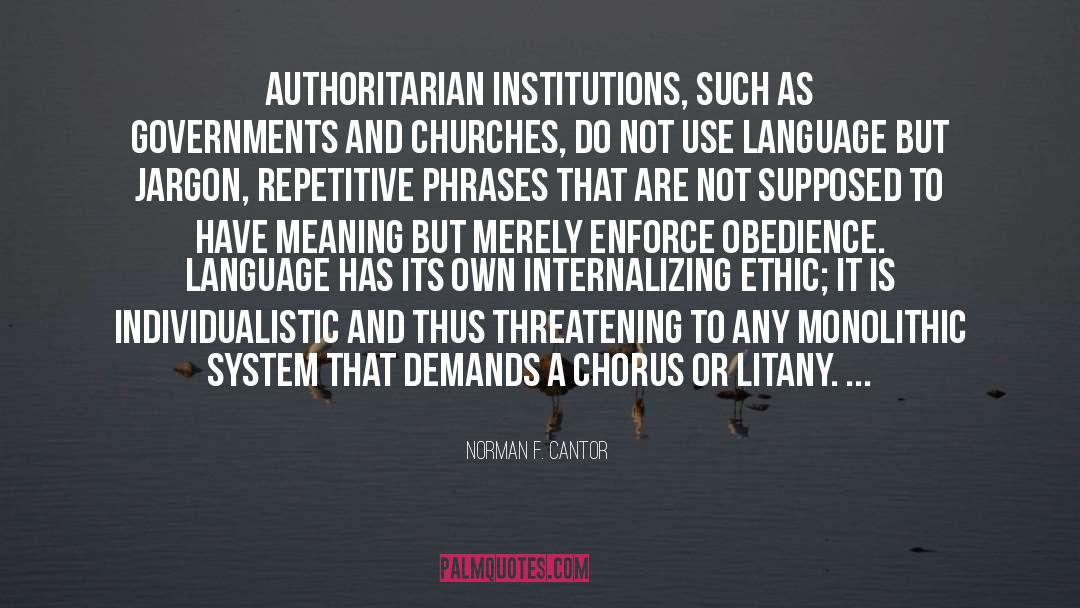
from its beginning, Egypt was a densely settled agricultural community. Its soil was rich, and because farming necessarily ceased during the months of the annual inundation, its people were not forced to toil endlessly in order to survive. The peasant farmers could support a wealthy aristocracy without suffering extreme privation, and an important segment of the population was able to devote a substantial amount of time to nonagricultural pursuits. In shorts, for most of its long history, Egyptian civilization was wealthy and comfortable.
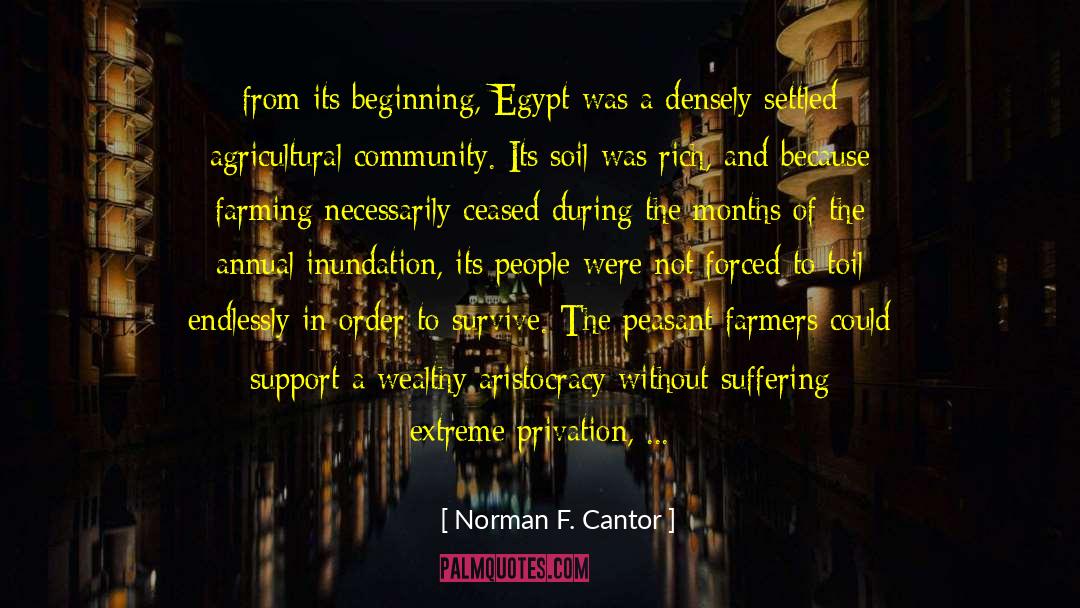
By the early fifth century, the Church that had begun as a tiny group of fishermen and other poor people meeting in modest abodes had joined the Roman trend in classical culture in becoming logocentric, relying heavily on written texts -- the Bible, the sacramental services, and the theology of the Church Fathers.
"Beginning as a movement in Egypt around 200 A.D. and reaching France by 500 A.D., a special place of holiness was attributed to monks and nuns in a monastic setting because of their celibacy. Monks often became bishops; nuns were told to stay in their convents and shut up.

In the field of medicine, Galen, the Alexandrian scientist, propounded a view that is still around, nowadays called 'alternative medicine.'It was taught in many medical schools until the mid-nineteenth century and now is becoming popular again. Human health is the result of the balance of humors, or temperaments. Physical exercise, bathing, and herbal remedies keep the four temperaments in balance, or restore balance, in case one, such as melancholia (depression), comes to dominate. Today's transactional psychiatry teaches much the same medical doctrine as Galen did.
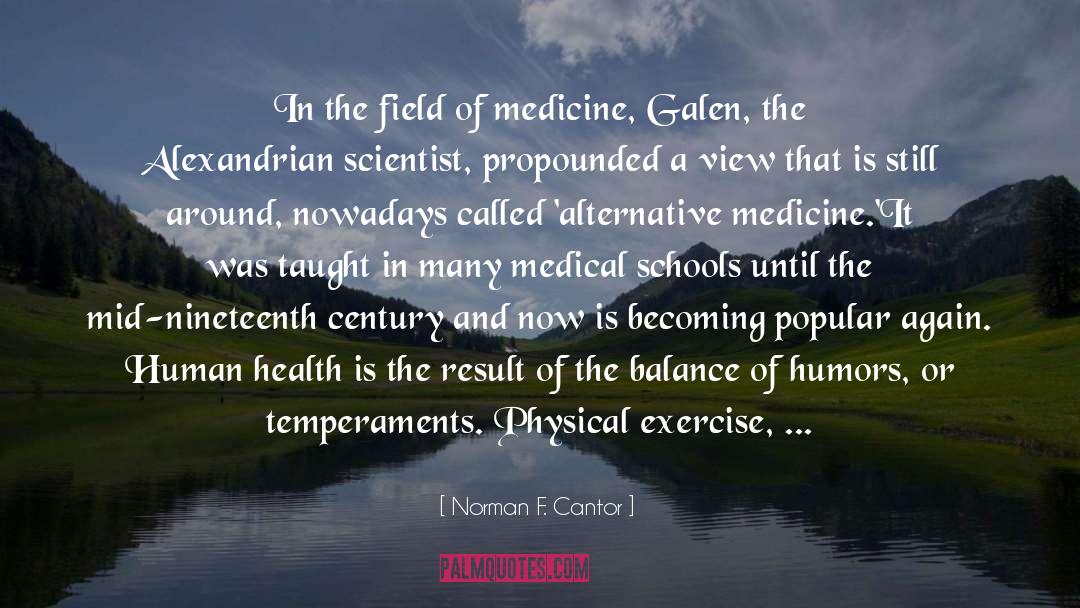
The central government was a despotism tempered by military rebellion and assassination and replacement of one scurvy lot of ruling dynasts by another. But the high politics of the city of Rome little affected the lives of the masses or even of the provincial nobility. It was the wonderful army that provided the continuity and peace that this vast population enjoyed.

National historical myths are a way of giving identity and more authenticity to a people. Exodus flattered the Jews half a millennium after it allegedly took place by making them feel like heroic refugees from slavery, and righteous conquerors of a land corrupted by paganism, wealth, and sex. The Illiad made the politicians, merchants, sailors, farmers, and schoolteachers of Athens in the fifth and fourth centuries B.C. into the heirs of austere, remorseless, honorable, courageous warriors, a race of demigods. Contrast this with the real Athenians of ca. 375 B.C. -- their bellies full of fishcakes, their throats bloated with cheap resined wine, their far-flung sharp commercial deals a laughable, reverse mirror-image of the noble warriors of the Trojan War era.
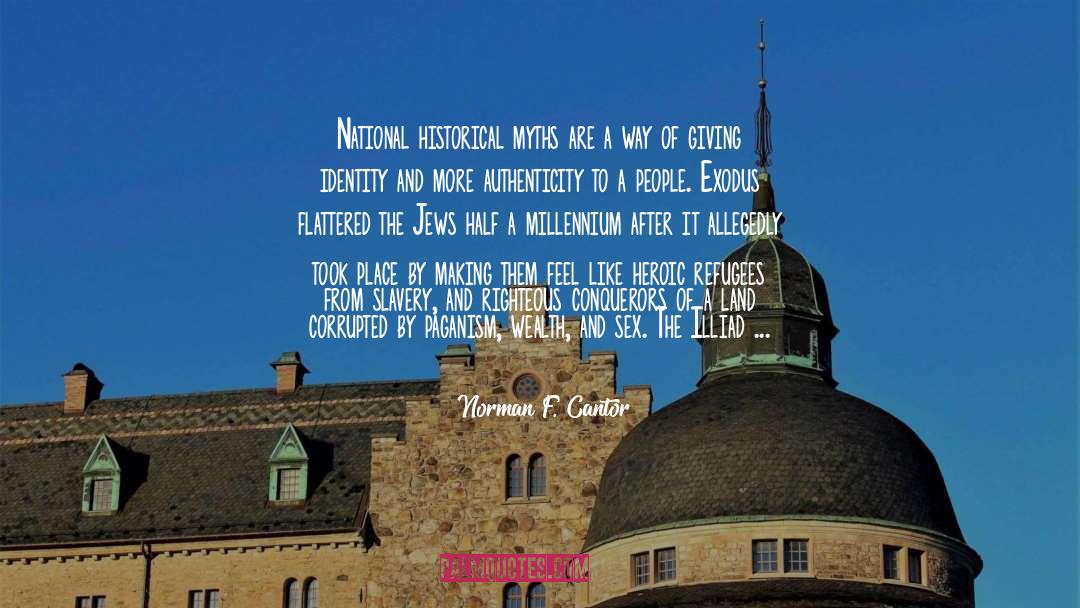
Christian legend later claimed that Peter also went to Rome and there became head of the Christian community, that is, a bishop. Both Peter and Paul, according to the Catholic version, died as martyrs in the Eternal City. Paul definitely went to Rome, and may have been martyred there. But that Peter, a very devout, timid Jewish fisherman, uneducated, and knowing little or no Greek, and no Latin, would have ended in Rome is most unlikely. Thus the whole claim of later bishops of Rome (the popes) that their authority in the Church was derived from its alleged first bishop, Saint Peter, was likely wishful thinking, if not an absolute hoax, that developed in the late second century A.D.
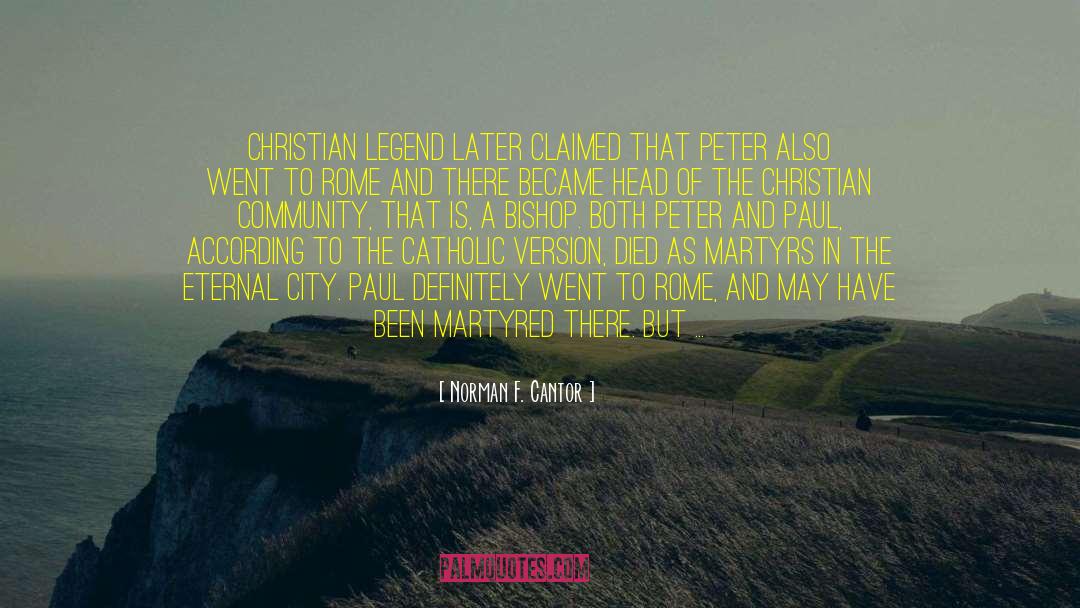
The Gnostics (also called Manichees) postulated that there were two gods -- the Christian God of goodness and light, and an evil anti-God of darkness. This theory proved an easy explanation of why there was evil in the world. It was rejected by Catholic Christianity in favor of the monotheistic view that there was one God who created only goodness. Evil was sin, a rebellious falling-away from God, a perversion of His goodness. This was the foundation of the evolving Christian concept of Satan.
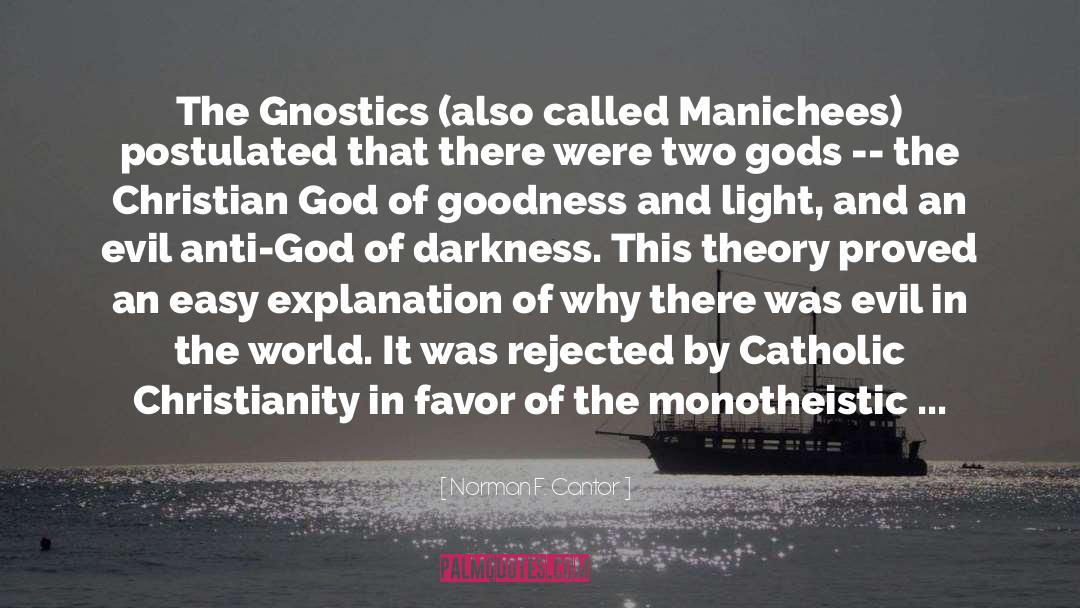
Judaism was a legal religion in the Roman Empire; Christianity was not until the first Christian emperor ascended the throne in the fourth century A.D. There were periodic persecutions of the Christians by the imperial state and local officials. The resulting martyrs, often upper-class women of unusual devotion, only served to draw more attention and converts to the Church.
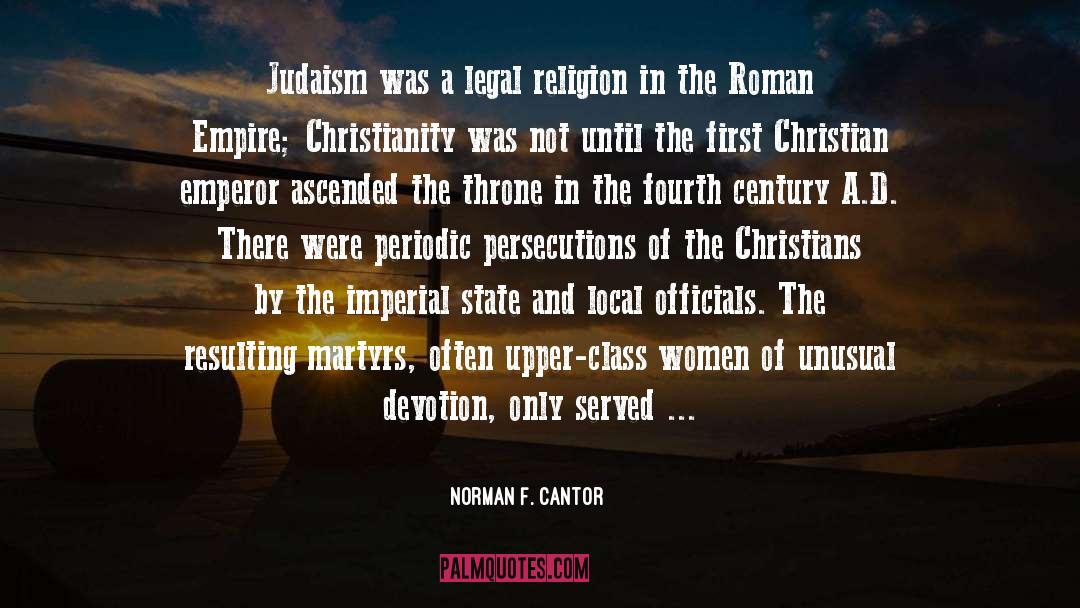
An economy built on slave labor is vulnerable in two ways. One, availability of forced labor discourages technical innovation. The very wealthy [Roman]empire experienced no industrial revolutions. Two -- even more crucial -- slaves do not reproduce their own numbers. As Rome's wars of conquest ended, the slave population began to shrink, leading to a shortage of agricultural laborers by 200 A.D.
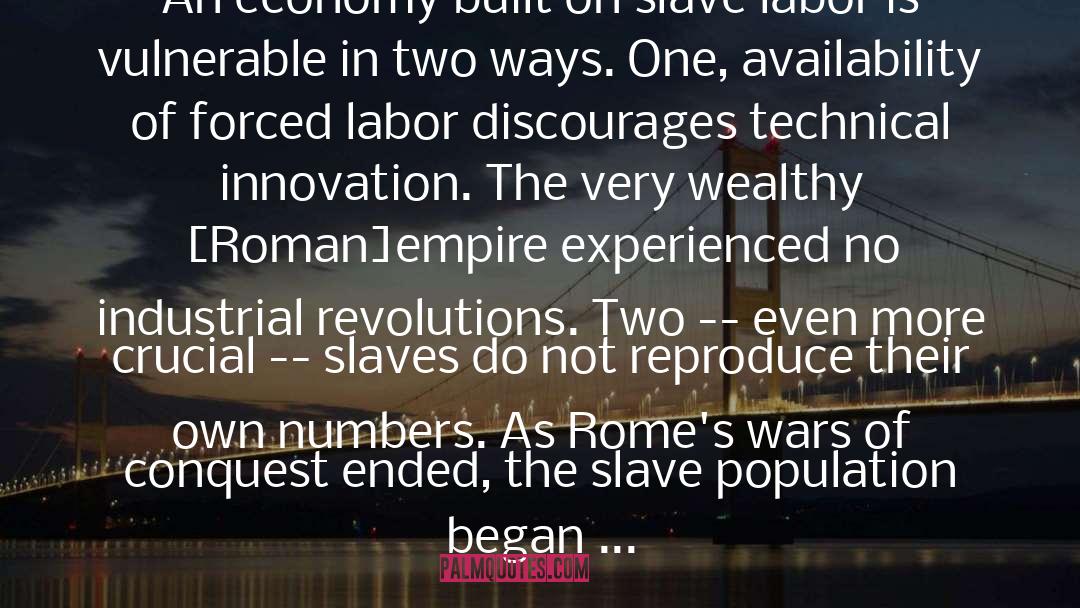
[Roman] society became steadily more cosmopolitan. By 212 A.D., all inhabitants of the empire, except for slaves, were deemed to be citizens. The old Roman aristocracy was not fixated upon race and color. Wealth and literacy were what opened the doors of their urban mansions and country villas.
![Norman F. Cantor Quotes: [Roman] society became steadily more Norman F. Cantor Quotes: [Roman] society became steadily more](https://palmquotes.com/author/norman-f-cantor-quotes-320635.jpg)
Sacramental attachments to a dying a resurrected savior was a common idea in the Roman Empire. The religion of Mithraism, very popular in the army and open only to males, bathed the initiate in the blood of a bull.
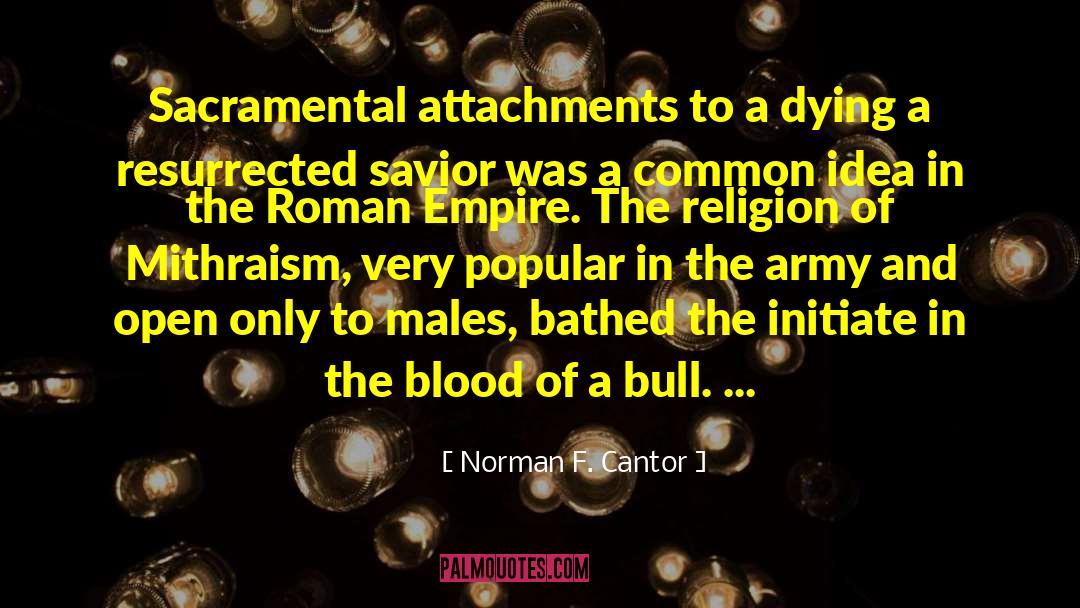
The cathedral canons of [the Middle Ages] were well educated and leisured. They gave little or no thought to the problems of old Europe. They lived a cloistered, segregated, and selfish life, much like Ivy League professors today.
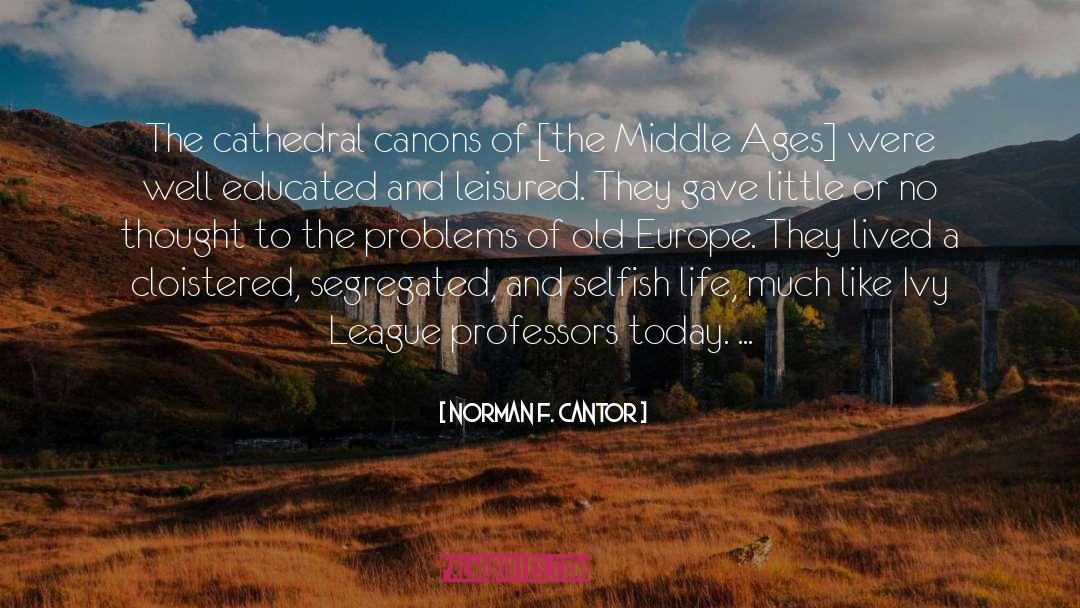
There was no money economy in Egypt, and all exchange of goods was carried out by barter. Each citizen paid a tax in kind of everyt5hing he produced, and the wealth of the pharaoh thus consisted of the grain, livestock, and other goods that he took as taxes. He also received metals and other goods as tribute or in trade from abroad.
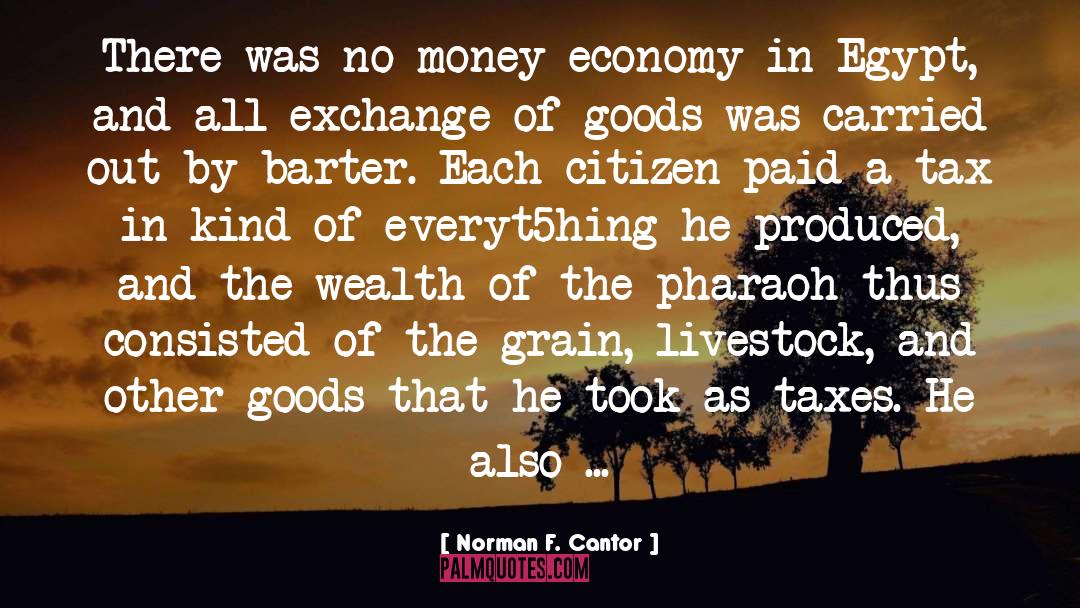
Because the Egyptians had no feeling that events of the moment were transitory, they viewed the present as eternal. The world was static; what seemed like change was only recurrence of the eternal order. Thus, Egyptian literature does not contain careful records of the deeds, or distinctive characteristics of the pharaohs. Rather they are portrayed as the divine ideal, always just, wise, bold, strong, and victorious.
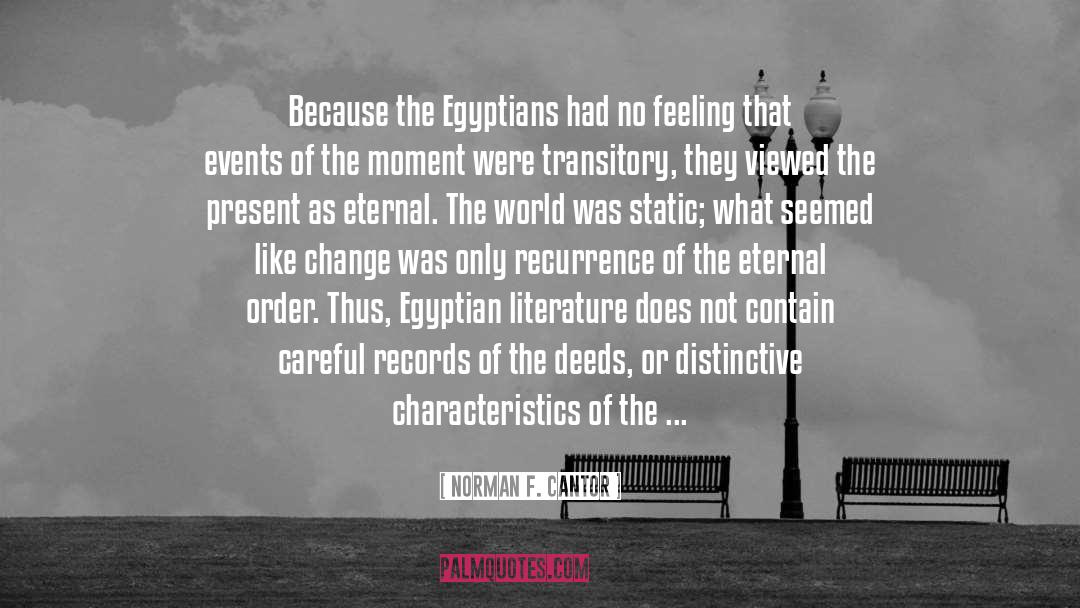
Morality was viewed by the Egyptians not as the assertion of self against the world but rather as the individual search for harmony with the eternal order ... The Egyptian was free to seek out a place in a benevolent world order, but he was not to disrupt it by either nonconformity or self-abnegation.
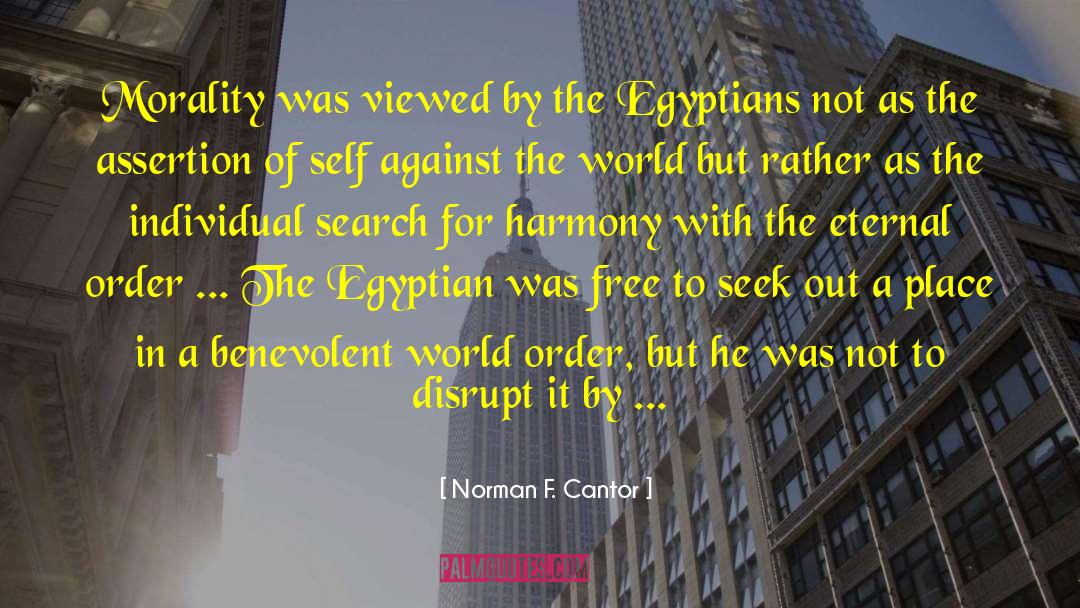
There was some kind of cultural cause for the decline of the ancient world. It was neither corruption of public spirit nor Christianity. It was due to the rise of the logocentric culture rooted in written text. This engendered, in general, a conservative, backward-looking frame of mind, hostile to critical military and technological innovation. It widened the gap between the highly literate elite and the still-illiterate masses. It aroused social strains that the imperial government would not, or perhaps could not, confront. Once the Visigoths had won a lucky battle or two, a general pessimism, docility, and privatism settled in.
"The ancients had a phrase for this. They said the world was 'growing old.' It was a mature culture. The Roman in late antiquity needed social and intellectual restoration, not more intensive cultivation of the classical heritage.
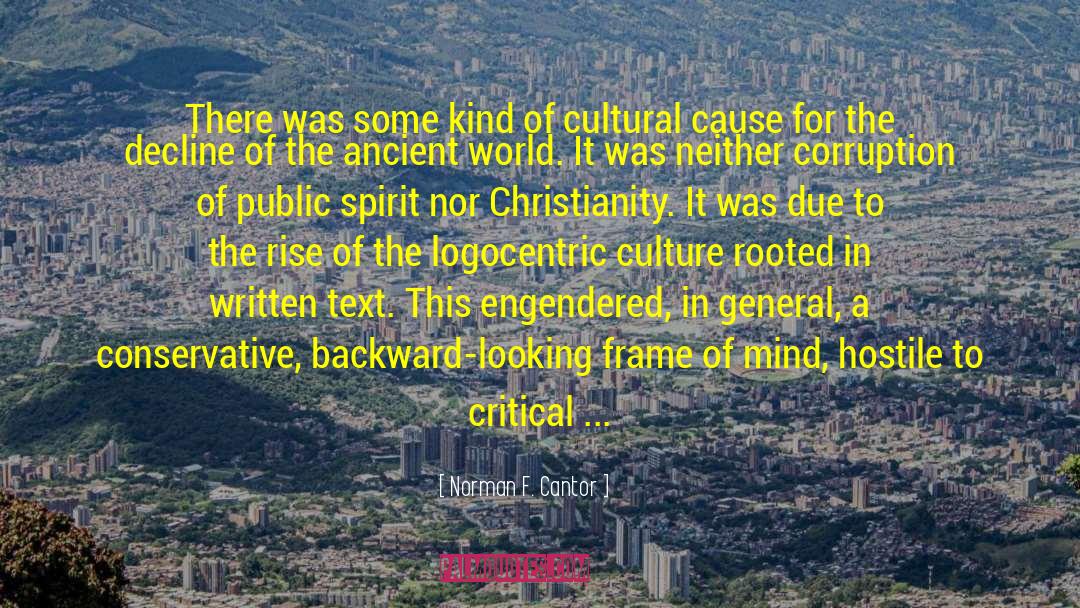
The ultimate triumph of Christianity was aided by the internal drive within Roman paganism toward some kind of monotheism. By 150 A.D., whatever vitality had once existed in ancient polytheism had mostly declined, and the gods played little or no role in individual lives. The state temples to the old gods became civic centers rather than religious entities.
"But paganism went about reforming itself. It drew upon the Alexandrian mystical form of Platonism, taught by Plotinus -- what we call Neoplatonism -- to conjure an image of the deity as a single spiritual fountain of life that fructifies the world.
"This Neoplatonic monotheism became popular in aristocratic circles in fourth-century Rome and gave such renewed vitality to paganism that the triumph of Christianity had to be bolstered by state proscription of this latter-day monotheistic paganism. By 390, Roman paganism was almost as close to monotheism as was Christianity.
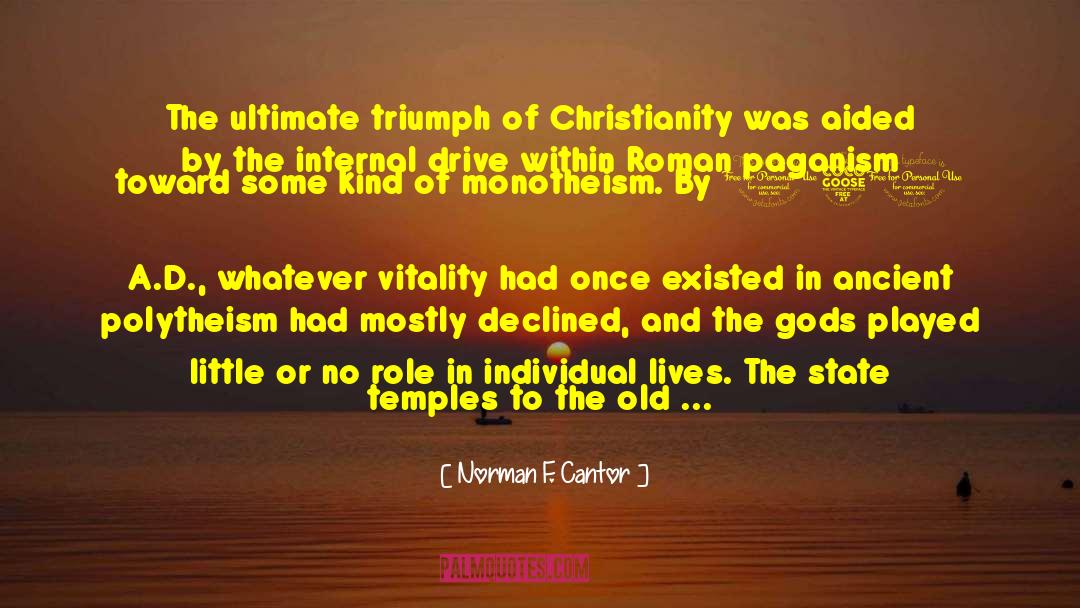
[Egyptian] advances in medicine, however, as well as in other areas of science, were limited to their attempts to solve the problems confronting them. They did not attempt to probe into the realm of theory.
"History for the Egyptians was the cyclic recurrence of the elements of the divine eternal order. Just as the land was reborn each year, so the pharaoh who died and became Osiris was reborn in Horus, his son and successor. The passage of time was marked by the succession of pharaohs, who were grouped into dynasties and numbered.
![Norman F. Cantor Quotes: [Egyptian] advances in medicine, however, Norman F. Cantor Quotes: [Egyptian] advances in medicine, however,](https://palmquotes.com/author/norman-f-cantor-quotes-981069.jpg)
The only clear expression of intellectual dissent from hydraulic despotism occurred in the southern half of the coastal lands of the eastern Mediterranean, called variously Canaan, Palestine, Israel, Judah, and today, Israel again. Here and in a satellite Jewish colony in Iraq, between 800 and 500 B.C., visionaries ("the Prophets") -- namely Amos, Ezekiel, Isaiah (at least two different writers writing under this name), and Jeremiah -- wrote elegant poems calling for social justice in the world and a freer, more open and humanitarian society.
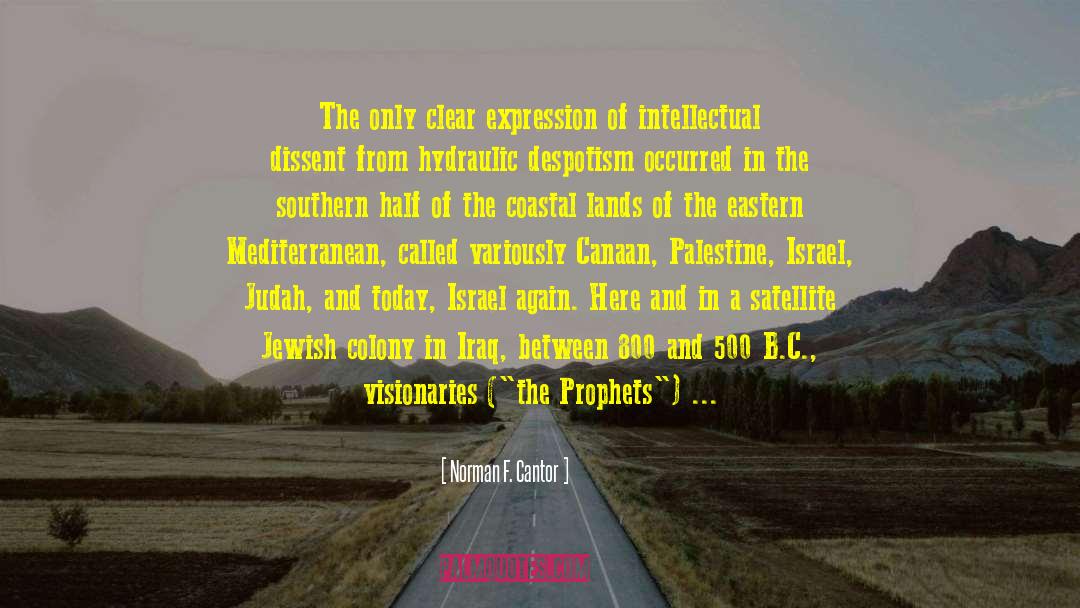
The Stoics taught a life of restraint and control, the personal cultivation of learning, beauty, and reason. The Stoics asked the Romans to realize that much that is encountered in life is beyond the individual's control. Make the best of what can be humanly cultivated. It is a kind of Platonism shrunk to a pursuit of private feelings and thoughts: Do the best with what you can control and refine, and let the rest go.
"The world is rational, but it is only amenable to active intervention within the limits of the individual's capacity. Do not try to be an overachiever. Do not dream of social transformation. Private cultivation rather than social action makes for the good life. Although the slave Epictetus was one of the principal Stoic writers, the emperor Marcus Aurelius's upper-class background is more typical of its devotees.
"Stoicism is a narrow ethic, one suitable to the emotional and intellectual needs of aristocrat and slave alike, but less useful for the ambitious middle class.
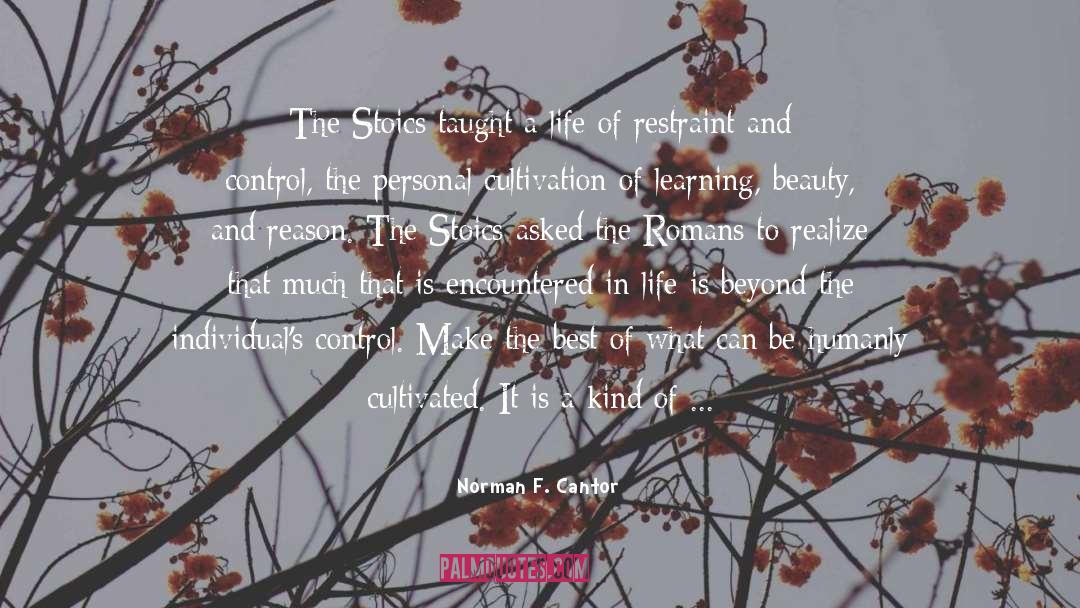
The great impact of Hellenistic culture was, however, no in natural science, but in the more Plato-inspired imaginative literature. The modern novel has its origins in the ultra-heroic and fantastic literature of the Hellenistic world intellectually centered in Alexandria. The life of Alexander the Great was itself one of the prime genres of Hellenistic romanticized literature, and remained so into the sixteenth century.
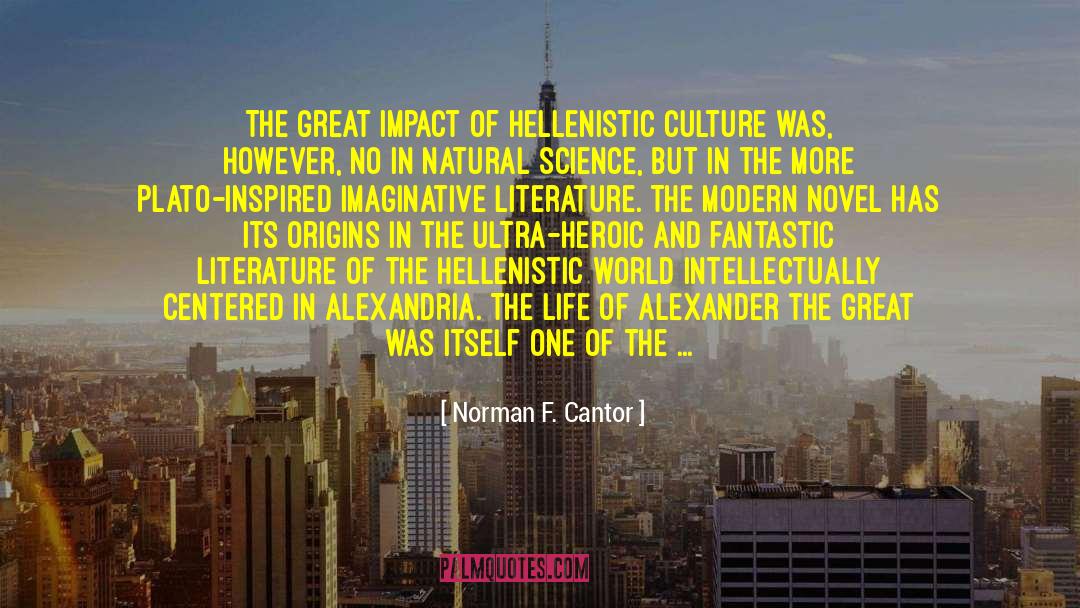
Plato had one Big Idea from which everything else derived. He fundamentally defined reality as that which is permanent and unchanging. Only ideas are permanent and unchanging; anything material deteriorates and decays.
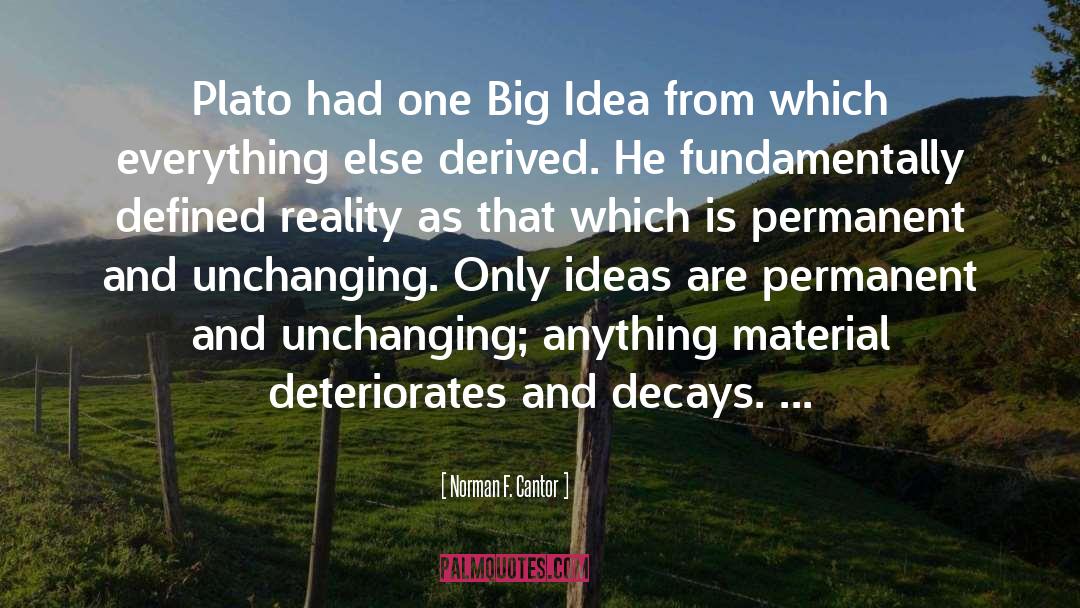
At this point, a social flaw that always existed with regard to the [Roman] aristocrats in their townhouses became more evident. No longer finding urban life as secure and amenable as in the early empire, the landed rich gave primacy not to their urban mansions but to their country estates, making the latter their principal residences. The dominant forces in urban life increasingly became the bishops and cathedral clergy.
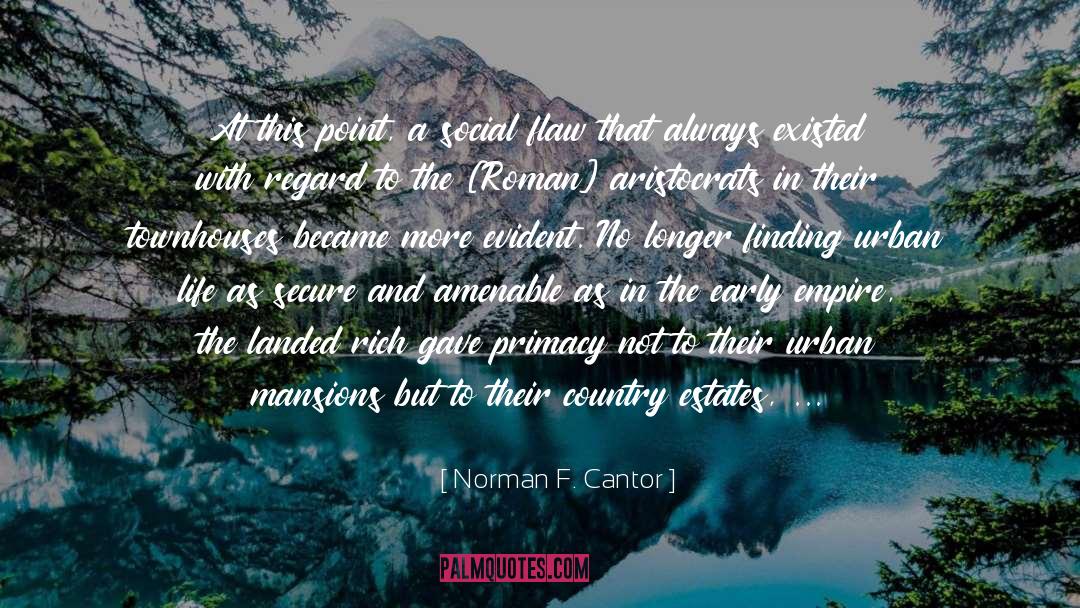
The most important fact to know about the Christian Church in the two hundred years after Jesus' death is that only at the end of this period did the Church comprise as many people as the far-flung Jewish community numbered (five million) in the Roman Empire. Christianity developed an intense rivalry with Judaism, and for many decades was compared to the Jews as a minority. This accounts for the intense anti-Semitism that became enshrined in Christianity by 200 A.D.
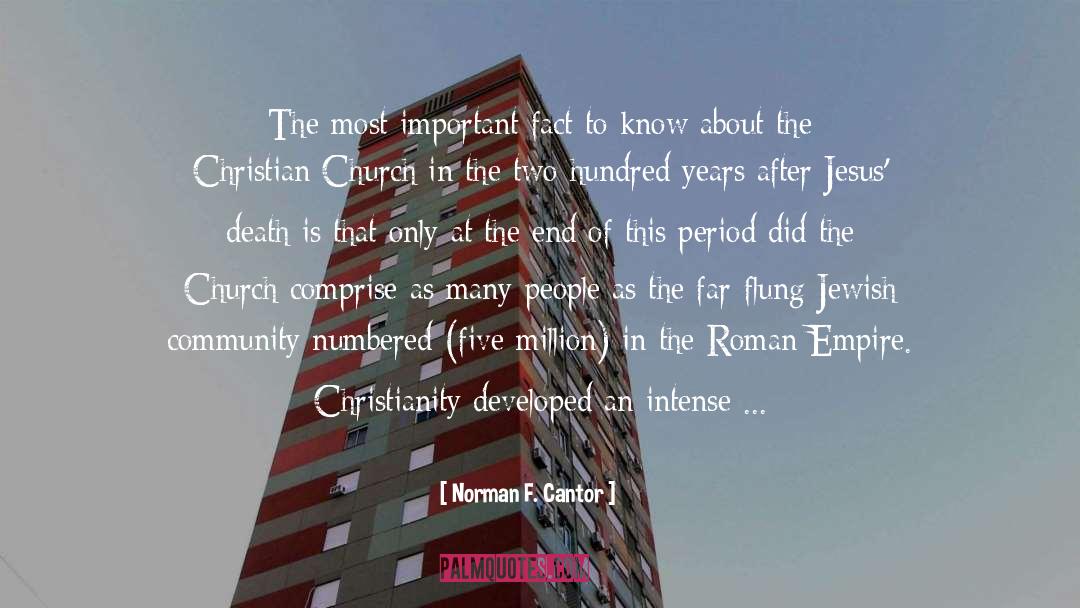
In response to [the Philistine] threat [in the ninth century B.C.], the Hebrews could no longer rely on the leadership of 'judges,' ad hoc military leaders (some of them, peculiarly, women; perhaps reflecting as feminists claim, and earlier matriarchal society).
![Norman F. Cantor Quotes: In response to [the Philistine] Norman F. Cantor Quotes: In response to [the Philistine]](https://palmquotes.com/author/norman-f-cantor-quotes-964182.jpg)
While many Greeks (although not Thucydides) thought that history moved in circles, repeating itself infinitely, the Jewish idea that each event was singular and proceeded along a straight line had a great impact on European thinking.
